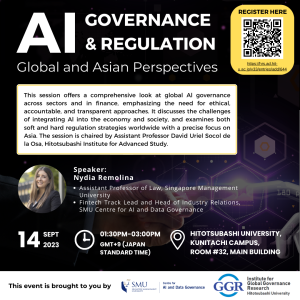The Institute for Global Governance Research (GGR) is delighted to announce that we will host a joint SMU/GGR talk session on September 14, 2023. The talk will be in English. Anybody who pre-registered is welcome to join the event.
| Title | AI Governance and Regulation: Global and Asian Perspectives |
| Speakers | Professor Nydia Remolina Leon (Head of the Industry Relations Centre for AI and Data Governance (CAIDG), Singapore Management University) |
| Date/Time | September 14(Thursday), 2023. / 13:30-15:00 |
| Venue | Kunitachi Campus, Hitotsubashi University (The venue will be notified upon registration) |
| Language | English |
| Registration link | https://hrs.ad.hit-u.ac.jp/v33/entries/add/644 |
【Summary of the Event】
This session presents a comprehensive overview of the current state of artificial intelligence (AI) governance and regulation, explicitly focusing on global and Asian perspectives. The discussion will delve into the intricate challenges and opportunities that arise in the context of AI’s rapid advancement and how regulators, corporations and other actors are approaching the topic of AI governance and ethics across China, Europe, the United States of America, the United Kingdom, India, Singapore and other jurisdictions.
The first part of the session will focus on the necessity of effective AI governance in a world where AI technologies, including generative AI, are becoming increasingly integrated into various sectors and the challenges created by a data-driven world. The session will then discuss the significance of a balanced approach that encourages innovation while safeguarding ethical considerations, privacy, accountability, and transparency in different sectors.
Then, the session explores the global landscape of AI regulation, highlighting the two main approaches adopted worldwide: a soft approach to AI Governance through the promotion of ethical AI principles and a hard approach through implementing key initiatives and frameworks. As part of those frameworks, the session will analyze initiatives such as the Artificial Intelligence Act and the AI Liability Directive of the European Union, the Chinese comprehensive AI Strategy, and regulations applicable to specific sectors in some jurisdictions (i.e., the financial sector, law enforcement, and others). The session focuses on the purposes of such approaches. It provides a critical view to discuss whether they could effectively protect individual rights in the age of AI and data analytics.
The session ends with an open discussion on the intricate balance required between fostering AI innovation and imposing appropriate controls and the need for adaptable and context-specific approaches to regulation while emphasizing the shared responsibility of stakeholders in ensuring that AI technologies are developed and deployed in ways that align with societal values and norms. Some examples of private-public collaborations will be provided to elaborate on the importance of interdisciplinary work among policymakers, industry experts, researchers, and civil society to address the multifaceted challenges posed by AI technologies.
We look forward to your participation.

